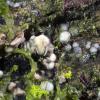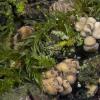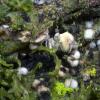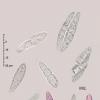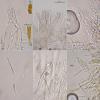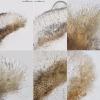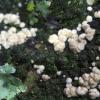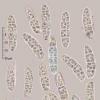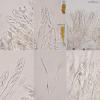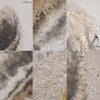
04-01-2026 17:45
 Stephen Martin Mifsud
Stephen Martin Mifsud
I was happy to find these orange asmocyetes which

03-01-2026 13:08
Niek SchrierHi all,We found groups of perithecia on a Lecanora

29-12-2025 17:44
Isabelle CharissouBonjour,J'aimerais savoir si d'autres personnes au

02-01-2026 17:43
MARICEL PATINOHi there, although I couldn't see the fruitbody, I

01-01-2026 18:35
Original loamy soil aside a artificial lake.The co

31-12-2025 19:27
Collected from loamy soil, at waterside (completel
Calycina-like on bark of Pseudotsuga
Enrique Rubio,
10-02-2021 20:52
These small caespitose, sessile, pulvinate apothecia are bluish-grey when young but turn ochraceous at maturity. The margins are very hairy and the spores (very few free) are fusiform and usually with three septa at maturity even inside the asci.
I think in a Calycina-like fungus.
Could you help me?
Hans-Otto Baral,
10-02-2021 20:59

Re : Calycina-like on bark of Pseudotsuga
There is much light brown globulosa, could it be something related to "Mollisia" ramealis? A Cenangiaceae then?
Enrique Rubio,
10-02-2021 21:48
Re : Calycina-like on bark of Pseudotsuga
Hi Zotto
Thanks again!
Surely is not ramealis, but Cenangiaceae does not seem a bad proposal.
Enrique
Thanks again!
Surely is not ramealis, but Cenangiaceae does not seem a bad proposal.
Enrique
Lothar Krieglsteiner,
11-02-2021 05:20

Re : Calycina-like on bark of Pseudotsuga
Only a fools question: paraphyses with vacuolar bodies, excipulum a brown globulosa, porus of IKI-type: this I would have determined a Mollisia. Why can`t it be one?
Best regards, Lothar
Best regards, Lothar
Hans-Otto Baral,
11-02-2021 08:29

Re : Calycina-like on bark of Pseudotsuga
Good idea Lothar! On woody substrates I do not know such large-spored Mollisias, except M. ramealis which turned out to be misplaced (correct is Cenangiaceae).
Enrique Rubio,
11-02-2021 12:04
Re : Calycina-like on bark of Pseudotsuga
Hi Lothar.
However, the fungus was not at a proper stage of maturation and I do not even have a proper idea about the morphology and dimensions of the spores.
However, the fungus was not at a proper stage of maturation and I do not even have a proper idea about the morphology and dimensions of the spores.
Hans-Otto Baral,
11-02-2021 12:12

Re : Calycina-like on bark of Pseudotsuga
From your two photos of living asci I am absolutely sure that the spores are normally septate already within the living asci.
Lothar Krieglsteiner,
11-02-2021 12:32

Re : Calycina-like on bark of Pseudotsuga
Hi Enrique and Zotto,
"Mollisia" ramealis I also know - it is already very different macroscopically.
Best regards, Lothar
"Mollisia" ramealis I also know - it is already very different macroscopically.
Best regards, Lothar
Enrique Rubio,
11-02-2021 14:12
Re : Calycina-like on bark of Pseudotsuga
Hi Zotto and Lothar
I am also sure that they are septate inside the asci and that their morphology is fusoid, but seeing hardly any free spores is always very uncertain. I will try to study it at a better time.
Thanks to both of you.
I am also sure that they are septate inside the asci and that their morphology is fusoid, but seeing hardly any free spores is always very uncertain. I will try to study it at a better time.
Thanks to both of you.
Hans-Otto Baral,
11-02-2021 14:44

Re : Calycina-like on bark of Pseudotsuga
The asci look well-developed. Some species or genera do not easily eject their spores, one must be patient with the water mount.
Enrique Rubio,
11-02-2021 14:48
Re : Calycina-like on bark of Pseudotsuga
When I was studying it, I already saw that it was not at its best. The asci with very few spores and the whole looking rather unappetising for study.
I think it would be better to wait for the spring to come closer and there might be material in better conditions. I'll keep you informed
I think it would be better to wait for the spring to come closer and there might be material in better conditions. I'll keep you informed
Enrique Rubio,
23-02-2021 20:45
Re : Calycina-like on bark of Pseudotsuga
New collections of this fungus show many free ascospores (1-)3-septate with a gel sheath after discharge and a new study of the excipulum show a clearly textura globuloso-angularis.
So, I think, as Lothar suggested, it is very close to the genus Mollisia. The mature apos reddening.
So, I think, as Lothar suggested, it is very close to the genus Mollisia. The mature apos reddening.
Hans-Otto Baral,
23-02-2021 21:14

Re : Calycina-like on bark of Pseudotsuga
Now I think you should look in Calycellina, folder betulina, and search for Chalara around the apos. - No, I must revise this, the globulosa contradicts it. C. betulina has at. oblita. - No idea.
Enrique Rubio,
23-02-2021 21:36
Re : Calycina-like on bark of Pseudotsuga
You don't think it might be close to Mollisia? The spores are certainly not typical of this genus.
Hans-Otto Baral,
23-02-2021 21:42

Re : Calycina-like on bark of Pseudotsuga
It is a possibility, but sometimes the similarities are only superficial adaptations. See "Mollisia" ramealis.
Enrique Rubio,
23-02-2021 21:43
Re : Calycina-like on bark of Pseudotsuga
Yes. You're right.



